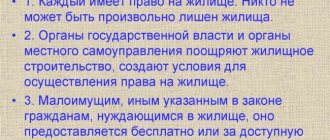The right of operational management, as a legal institution, was first introduced into legislation in 1961, initially only to designate the property rights of state organizations. In 1981, it was extended to cooperative, state-cooperative, and inter-collective farm enterprises.
In accordance with Article 296 of the Civil Code of the Russian Federation, the right of operational management of property is a limited real right that provides a state-owned enterprise or institution with respect to the property assigned to them, the opportunity to exercise, within the limits established by law, the rights of ownership, use and disposal of property, in accordance with the goals of their activities, the tasks of the owner and the purpose of the property.
The Civil Code of the Russian Federation provides that property under the right of operational management can be transferred to a state-owned enterprise and institution.
Operational management applies to property that is under the control of the owner, trustee or organization. These persons have the right to dispose of it in accordance with production needs based on the operating rules.
Considering the question of what is the right of operational management, we can conclude that this is the activity of a managing entity, which is aimed at influencing the property to achieve the goals set by the company. In practice, its essence lies in the implementation of the production plan, as well as continuous control over the completeness and timeliness of its implementation.
This economic mechanism allows you to make a profit from equipment that is not in use by transferring it to third parties under certain conditions.
Features of operational management
Operational property management has a number of specific features:
- It is carried out continuously at all stages of the production process in order to achieve the set goal as much as possible.
- Consequences occur not only at a specific moment of management, but also in subsequent periods. This may also apply to the period when the operational management contract has expired.
- It has a specific goal, without which any management activities are ineffective and make no sense. This can be expressed in monetary units or in terms of labor productivity.
- It is the basis of tactical and strategic plans and the main mechanism for translating them into reality.
Object and subject of operational management law
In accordance with the legislation that is in force in 2019, the subjects of operational management rights are state-owned enterprises and institutions that are financed by the owner.
State-owned enterprises are created on the basis of state and municipal property. Institutions can be created by any form of ownership, both state, municipal or private.
The objects of operational management law include:
- The enterprises themselves are considered as property complexes. In addition, the objects of the right of operational management include property that is part of these property complexes, necessary for the implementation of the activities of enterprises.
- Cash.
Operations management process
The operational management process consists of a number of activities. The main ones:
- Establishing exact coordinates and time frames in accordance with which the objects will be operated.
- Continuous management of all processes and operations that are carried out throughout the entire period of operational management.
- Constant monitoring of the current state of affairs in order to compare it with planned indicators.
- Prompt response to any deviations in the process to implement corrective measures.
The disposal of property is carried out not only in accordance with the statutory documents, but is also regulated by legislative acts.
The right of operational management can be granted directly to the owner of the objects or to the organization to which he has delegated certain responsibilities.
Enterprises have very limited powers, since the owner can dispose of the property at his own discretion at any time.
A prerequisite for the transfer of property to operational management is that it must be used strictly for its intended purpose, in accordance with the purposes specified in the organization’s statutory documents.
If the conditions are violated, the owner has every right to seize material assets. Misuse of property must be confirmed by an act drawn up based on the results of a special inspection.
Goals and objectives
There are several reasons why real estate is transferred to operational management.
- The most important thing is maintaining objects in a healthy state. It happens that some building has stood idle for a long time, while the local cannery is huddled in a one-story small house. In this case, it is beneficial to transfer the building to the plant so that it can service it and keep it in good technical condition.
- If we are talking about real estate from a private owner, then he transfers his property to operational management with one purpose - so that it begins to “work” and bring in money. The question of functional fitness fades into the background. The object may be returned to the owner after some time: it is impossible to sell, give or lease real estate in the OU.
The director of an enterprise, after receiving the right to operationally manage real estate, sets himself several tasks - his income and the income of his employees will depend on their implementation.
- Facilities must have their own structure: an enterprise, in addition to the building, must have equipment and transport, a school must have a football field and sports equipment on the street.
- Objects must be profitable: if it is production, it must generate income and not buy expensive equipment every year; if it is a school, it must not make repairs in the director’s office every year, unnecessarily.
- In general, the costs of maintaining and operating facilities with such management must be reduced. Regularly maintain and maintain equipment.
Each enterprise or government institution has its own priorities for completing these tasks.
Registration procedure
Registration of the right to operational management of real estate is carried out in Rosreestr on the basis of documents that establish the existence of rights to such property, in particular:
- Application for state registration, its form is approved by order of the Ministry of Economic Development of Russia.
- Agreement on the transfer of the relevant property under the right of operational management.
- Contract of sale.
- The owner’s decision to secure the property under the right of operational management.
- Documents on state registration of the institution and its constituent documents.
- Documents about the property.
The order of Rosregistration reflects that state registration of the right of operational management of state enterprises to real estate objects that are state-owned is recommended to be carried out simultaneously with state registration of the right of state or municipal ownership of these objects.
The registration procedure consists of the following steps:
- examination of the authenticity and correctness of documents submitted by both the owner and the authorized representative;
- submitting a request to government authorities to obtain permission to register an operational management;
- conducting an examination and technical inventory of property objects in relation to which contractual relations will be concluded;
- registration of operational management with specialized government bodies and obtaining relevant documents.
It is worth considering that the possibility of submitting documents for state registration in electronic form is not provided. Therefore, a contract concluded as a result of bidding in electronic form cannot be submitted for registration.
For state registration of the transfer of rights to real estate, you need to provide the required number of original copies of the contract in paper form.
List of documents for registration of operational management
To formalize the right of operational management, you need to prepare the following list of documents:
- Originals and notarized copies of constituent documents.
- Cadastral passport or plan of production and non-production premises.
- An agreement containing information on the transfer of rights and powers relating to operational management.
- A document that contains information about property transferred to a third party or organization.
- An act recording the acceptance of property by a trustee.
Transfer of real estate to the OS
Real estate is assigned to institutions or enterprises by their owner. Most often this is state property. Therefore, the decision on the transfer is made by the body authorized to manage municipal facilities.
The decision can be in the form of an act, order or other regulatory document:
- After the decision to secure the object, you need to draw up a document about its actual transfer - an act of acceptance and transfer.
- After this, the property is removed from the balance sheet of the municipality and goes through the procedure of its state registration for operational management.
- The institution or enterprise receives a standard certificate of successful registration.
What is the difference between the right of economic management and operational management?
The right of economic management and operational management in the Civil Code of the Russian Federation is the property rights of persons who are not owners.
The right of economic management refers to the mechanism within which the management of a state enterprise is able to use the property of the corresponding company within the limits established by law and other regulatory sources.
The owner of a company in which the economic management mechanism is the state has the right:
- Control how the company’s management exercises the right of economic management.
- Appoint the management of a state company.
- Carry out enterprise reorganization.
- Use part of the profit from the use of assets.
If the owner discovers that property is being used for business purposes other than for its intended purpose, he has the right to withdraw it from the fixed assets of the enterprise.
The main difference between the law of economic management and operational management is that the subject of the first mechanism is the management of a state enterprise. In the second case, the range of possible participants in legal relations related to property management is much wider.
Property rights of persons who are not owners (limited property rights): general characteristics
1
. The category of property rights, along with the right of ownership, includes other so-called limited property rights, namely the rights of persons who are not the owners of the thing. Limited real rights are derived from the right of ownership. They can arise only in the case when the ownership of a thing has already arisen, when the thing has already been appropriated by a certain person. Like the right of ownership, limited real rights have all the necessary features of a real right, which make it possible to distinguish them from obligatory rights. Rights of persons who are not owners, i.e. limited real rights represent the right to someone else's thing. At the same time, they have such characteristics as the right to follow and the absolute nature of protection.
Limited real rights, in contrast to rights of obligations, can arise only in cases expressly provided for by federal law. Property rights of persons who are not owners, or limited property rights, of course, should be separated in legislation, but the criteria for distinguishing them from obligations rights should be significantly updated.
2
. Article 216 of the Civil Code provides a non-exhaustive list of limited real rights. In particular, these include: the right to lifelong ownership of a land plot (Article 265 of the Civil Code); the right to permanent (indefinite) use of a land plot (Article 268 of the Civil Code); easements (Articles 274, 277 of the Civil Code); the right of economic management (Article 294 of the Civil Code) and the right of operational management (Article 296 of the Civil Code). It seems that by simply listing them it is hardly possible to get an idea of the system of limited real rights. The following types are distinguished in the legal literature:
- the right to use other people’s things, for example easements;
- the right to receive a certain value from someone else’s thing, for example, the right to receive rent at the expense of the value of an immovable thing;
- the right to acquire a known thing, for example, the pre-emptive right to purchase an immovable thing or a share in the right to it.
The specificity of the legal regime of individual rights to other people's things is most fully reflected by their division based on a mixed criterion (depending on the characteristics of the content and object) into: a) easements; b) the right of permanent (indefinite) use and lifelong inheritable ownership of land plots; c) the right of economic management and operational management.
3
.
In accordance with Art. 294 of the Civil Code, the right of economic management
is the right of a state and municipal unitary enterprise to own, use and dispose of property
within the limits
established by law and other legal acts.
Subjects
the rights of economic management are state and municipal unitary enterprises (with the exception of state-owned enterprises, which are subjects of the right of operational management).
The object
is both real and movable property, which is in state or municipal ownership.
The right of economic management of movable things in accordance with Art. 299 of the Civil Code arises for a unitary enterprise from the moment of the actual transfer of these things, unless otherwise established by law or by decision of the owner himself. The right of economic management to immovable things arises in a unitary enterprise from the moment of state registration of this right.
Termination of the right of economic management occurs on the grounds and in the manner prescribed by law for the termination of the right of ownership, as well as in cases of lawful seizure of property by the founding owner from a unitary enterprise (clause 3 of Article 299 of the Civil Code).
Only the Russian Federation, constituent entities of the Russian Federation and municipalities can act as the founder of a unitary enterprise.
The content of the right of economic management consists of the powers of ownership, use and disposal of property assigned to the owner, as well as property acquired by a unitary enterprise as a result of its activities.
A unitary enterprise has the same powers in relation to property as the owner. But it is necessary to pay attention to the limits established by law for the exercise of these powers by a unitary enterprise. Unitary enterprises are legal entities with special legal capacity (Article 49 of the Civil Code). Thus, the exercise by a unitary enterprise of the right to use is conditioned by the activities defined in the charter of this enterprise. The owner of the property of a unitary enterprise has the right to exercise control over the intended use and safety of the property. In addition, the owner of the property has the right to receive part of the profit from the use of property transferred to the enterprise (Article 295 of the Civil Code).
Restrictions are also established in relation to the exercise of the power of disposal by a unitary enterprise. A unitary enterprise can independently dispose of movable property only within the limits that do not deprive it of the opportunity to carry out its statutory activities (Article 18 of the Law on Unitary Enterprises). A unitary enterprise can dispose of real estate only with the consent of the owner (clause 2 of Article 295 of the Civil Code).
When characterizing the right of economic management of a unitary enterprise, it is necessary to note the following:
— the exercise of powers belonging to a unitary enterprise may be further limited by law and other legal acts (Article 295 of the Civil Code);
- norms of Art. 234 of the Civil Code on acquisitive prescription are not subject to application in cases where the property is assigned to a unitary enterprise with the right of economic management (clause 18 of the Resolution of the Plenum of the Supreme Arbitration Court of the Russian Federation No. 8).
The right of economic management is characterized by such a feature of limited real rights as the right to follow
. In accordance with paragraph 1 of Art. 300 of the Civil Code, when the ownership of a state or municipal enterprise as a property complex is transferred to another owner, the right of economic management of the unitary enterprise is retained.
4
.
The right of operational management
is a limited property right, which in its content is narrower than the right of economic management.
Subjects
operational management rights are
state-owned enterprises
(a type of unitary enterprises) and
institutions
. However, the content of the right of operational management among these entities differs in the scope of the powers included in its content.
State-owned enterprises
are commercial organizations (Article 115 of the Civil Code). Accordingly, the main purpose of creating a state-owned enterprise is to make a profit. At the same time, a state-owned enterprise is a legal entity with special legal capacity (Article 49 of the Civil Code); accordingly, the powers that constitute the right of operational management are of a strictly targeted nature, determined by the functions performed by the state-owned enterprise.
Object
includes both immovable and movable property that is in state or municipal ownership. Like the right of economic management, the right of operational management of movable things arises from the moment of their transfer by the owner, for real estate - from the moment of state registration of the right.
A state-owned enterprise owns, uses and disposes of the property assigned to it in accordance with the goals of its activities. Exercising by a state-owned enterprise the power of disposal
any property, both movable and immovable, is permitted only
with the consent
of the owner. A state-owned enterprise has the right to independently exercise the power of disposal only in relation to the products it produces (Article 297 of the Civil Code). At the same time, restrictions on the exercise of this power by law or other legal act are allowed.
Institutions
are non-profit organizations with special legal capacity (Article 120 of the Civil Code).
Institutions can be state, municipal and private. State and municipal institutions can be budgetary, autonomous
and
state-owned
. What is common between these types of institutions is that the exercise of powers to own and use property must be carried out exclusively in accordance with the purposes of their activities.
Characterizing the exercise by institutions of the power of disposal
, the following should be noted.
The most stringent regime is a private institution
who
cannot
independently exercise the authority to dispose of both the property assigned to him by the owner and property acquired at the expense of the owner. At the same time, it cannot be said that the power of disposal is completely absent from the content of the right of operational management of a private institution. In the case when, in the manner and within the limits provided for by law and the charter, a private institution carries out profit-generating activities, income from this activity and property acquired from these incomes come at the independent disposal of the private institution (clause 1 of Article 298 of the Civil Code) .
State institution
may exercise the power to dispose of property solely
with the consent
of the owner of this property. Moreover, if a state-owned institution, with the consent of the owner, in the manner and within the limits established by law and the institution’s charter, carries out profit-generating activities, then the cash receipts received from such activities go to the corresponding budget of the budget system of the Russian Federation (clause 4 of Article 298 of the Civil Code ).
of the budget is somewhat broader in content
and
autonomous institutions
.
Budgetary
and autonomous institutions have the right to independently dispose of the property assigned to them by the owner.
The exception is real estate
and
especially valuable movable
property; the exercise of the power of disposal in relation to these objects requires
the consent of the owner of
the institution's property. If an autonomous or budgetary institution carries out activities aimed at making a profit, then the income from such activities and the property acquired from these incomes come to the independent disposal of the institution (Article 298 of the Civil Code).
The owner of the property of a state-owned enterprise and institution has the right to seize the property assigned to them if two conditions are met:
1) the property is redundant, unused or used for other purposes;
2) when acquiring property, funds earned by the institution itself or a state-owned enterprise within the framework of authorized statutory activities were not used.
The right of operational management, like the right of economic management, is characterized by such a feature of limited real rights as the right to follow
. Thus, the transfer of ownership of property to another person is not grounds for termination of the right of operational management.
5
.
An easement is a real right to limited use of someone else's immovable property
(Article 274 of the Civil Code). Historically, this property right was the first to be recognized both in Roman law and in Russian pre-revolutionary legislation.
A modern easement is a limited real right to someone else’s thing, consisting of limited use of it. A thing burdened with an easement is called a servant, and a thing in whose favor the easement is established is called a dominant thing.
Object
acts as real estate (Articles 274, 277 of the Civil Code).
Subjects
are the owners of the dominant thing, as well as subjects of the right of lifelong inheritable possession and the right of permanent (perpetual) use of a land plot. In accordance with paragraph 4 of Art. 274 of the Civil Code, in cases directly provided for by federal law, an easement may also be established at the request of other persons.
Content
This limited property right constitutes the right
to limited use
of someone else's immovable property.
The owner of real estate encumbered by an easement must undergo certain restrictions on his rights. Encumbering an immovable thing with an easement does not deprive the owner of the servient thing of the rights to own, use and dispose of it. An easement does not burden the owner, but rather the thing. Accordingly, easement as a limited property right is characterized by such a feature as the right of succession
. When the ownership of an servient thing is transferred to another person, the encumbrance in the form of an easement is preserved.
As a general rule, an easement is established
by agreement between the owners of the servant and the dominant thing. If they fail to reach an agreement on the establishment of an easement, it is established by the court forcibly (clause 3 of Article 274 of the Civil Code).
Due to the special nature of this limited property right, the law also establishes special grounds for termination of an easement (Article 276 of the Civil Code). First of all, the basis for termination of an easement is the disappearance of the grounds on which it was established. Another basis for termination of an easement is the inability of the owner of the servient thing to use it in accordance with its purpose as a result of being encumbered by the easement.
6
.
The right to lifelong inheritable ownership of a land plot.
In connection with the introduction of the Land Code, this property right today exists in the format of experiencing the law. Article 21 of the Land Code preserves it only to the extent of “prior use”, i.e. recognizes the right of citizens acquired before the entry into force of the Land Code, not allowing in the future the provision of land plots on this right and prohibiting any, other than those included in the will, forms of disposal of a land plot that is in lifelong inheritable possession.
Object
is
a land plot
located in state or municipal ownership.
Subjects
citizens
(individuals) can have rights to lifelong inheritable ownership
Content
rights of lifelong inheritable possession constitute the powers
of ownership and use
of a land plot. The exercise of the right to dispose of a land plot is excluded, except for the possibility of transferring it by inheritance (Article 265 of the Civil Code).
7
.
The right to permanent (indefinite) use of a land plot.
Like the right of lifelong inheritable possession, the right of permanent (perpetual) use of a land plot cannot arise after the entry into force of the Land Code, but previously arisen rights in relation to land plots in state and municipal ownership remain in force. The right of permanent (indefinite) use of a land plot both in terms of object and content practically coincides with the right of lifelong inheritable possession, but has its own specifics.
Object
is
a land plot
located in state or municipal ownership.
Subjects
There can only be
legal entities
. Since the entry into force of the Land Code, i.e. from October 25, 2001, only state and municipal institutions, state-owned enterprises, state authorities and local governments can be subjects of this right.
Content
the rights of permanent (indefinite) use of a land plot constitute the powers
of ownership and use
within the limits established by law and the act on the provision of the land plot. There is no power of disposal in the content of this property right (Article 268 of the Civil Code).
8
.
The right of family members of the owner of residential premises living together with him in the residential premises
. As a limited property right to residential premises, Art. 31 of the Housing Code names the right of family members of the owner of a residential premises living together with him in the residential premises.
Object
This right is
residential premises
.
Subjects
There can only be
citizens
who are family members of the owner of the residential premises.
In accordance with Part 1 of Art. 31 of the Housing Code, family members of the owner include spouses, children, and parents living together with him in the residential premises. To recognize other relatives, disabled dependents, and, in exceptional cases, other citizens as family members of the owner of a residential premises, it is necessary that these citizens be moved by the owner into the residential premises belonging to him precisely as members of his family.
Thus, if there is a certain set of legal facts, almost any citizen can be recognized as a member of the family of the owner of a residential premises, even one who is not married, related or related to the owner. To do this, it is necessary to live together with the owner in the residential premises belonging to him and for the owner to move in this citizen precisely as a member of his family.
In accordance with paragraph 11 of the Resolution of the Plenum of the Armed Forces of the Russian Federation No. 14, in order to recognize these citizens as members of the owner’s family, it is necessary not only to establish the legal fact of the owner’s moving into the residential premises, but also to clarify the content of the owner’s will to move them in, namely: whether the person moved in for them residence in the residential premises as a member of his family or the residential premises were provided for residence on other grounds (for example, for free use, under a rental agreement).
As a general rule, a citizen who moves into a residential area, as a member of the owner’s family, acquires an equal right of use
residential premises, capable and partially capable family members of the owner bear joint and several
liability with him for the obligations
arising from the use of residential premises (Article 31 of the Housing Code).
Content
The property right in question constitutes the right
of use
.
Termination of family relations with the owner of a residential premises is the basis for termination of the right to use the residential premises by a now former member of the owner’s family. At the request of the owner, these citizens are obliged to vacate the residential premises; if these citizens refuse to do this voluntarily, then they are subject to eviction through a judicial procedure without the provision of other living quarters.
As an exception, Part 4 of Art. 31 of the Housing Code provides for the possibility of retaining the right of former family members to use the owner’s residential premises for a certain period of time based on a court decision. The basis for this may be circumstances such as the former family member’s lack of independent right to use another residential premises and the inability to provide themselves with other residential premises (buy an apartment, enter into a rental agreement for residential premises, etc.) due to their property status (no income, insufficient funds) and other circumstances worthy of attention (health status, disability due to age or health condition).
9
.
The right to use residential premises provided by testamentary refusal.
The essence of a testamentary legacy (legate) is that the testator imposes on one or more heirs the fulfillment, at the expense of the inheritance, of obligations of a property nature in favor of one or more legatees (legates), and the latter have the right to demand that the heirs fulfill this obligation. Thus, the execution of a testamentary refusal by the heir to whom ownership of the residential premises has passed gives rise to an independent property right in the legatee citizen.
It should be noted that, despite the presence of a testamentary refusal, the right to use the residential premises may not arise. This occurs in the following cases:
— application to the legatee of the rules on unworthy heirs (Article 1117 of the Civil Code);
- death of the legatee before the opening of the inheritance (Article 1138 of the Civil Code);
— refusal to receive a testamentary refusal (Article 1160 of the Civil Code);
- expiration of a three-year period during which the legatee did not exercise the right to receive a testamentary refusal (Articles 1137, 1138 of the Civil Code).
Object
This right is
residential
premises.
Subjects
Only
citizens (individuals)
.
Content
This right constitutes the right
to use
residential premises. The legatee has an equal right to use it with the heir to whom ownership of the residential premises was transferred. A legally capable and partially capable legatee bears joint and several liability with the owner of the residential premises for the obligations arising from the use of the residential premises (Part 2 of Article 33 of the Housing Code). However, this norm is dispositive in nature, since it allows that a different nature of liability may be established by a special agreement between the owner of the residential premises and the legatee.
The right to use the residential premises of the legatee is urgent and can be granted both for the period of the legatee’s life and for another period specified by the testator in the will (Article 33 of the Housing Code).
The right to use the residential premises of the legatee is characterized by such a feature as the right to follow
. In accordance with Art. 1137 of the Civil Code, a change of owner does not entail the termination of the right of the legatee to use residential premises.
10
.
The right to use residential premises on the basis of a lifelong maintenance agreement with dependents.
A lifelong maintenance agreement is a type of annuity agreement. In accordance with Art. 601 of the Civil Code, under this agreement, the citizen - recipient of the rent transfers real estate into ownership to the other party - the payer of the rent, and the payer of the rent undertakes to provide lifelong maintenance for this citizen and (or) the person indicated by him.
Thus, the volume of rent payments may include meeting the housing needs of the citizen receiving the rent. It should be noted that, on the one hand, the citizen - recipient of the rent is a party to the obligation, namely an authorized person - the creditor, who has the right to demand from the rent payer the fulfillment of his obligation to pay the rent. On the other hand, as a result of the rent payer fulfilling his obligation, the rent recipient has an independent property right - the right to use the residential premises.
Object
This right is
residential premises
.
Subjects
Only
citizens (individuals)
.
Content
This right constitutes the right
to use
residential premises (Article 34 of the Housing Code).
The legal status of the citizen - recipient of the annuity as a subject of limited property rights practically coincides with the legal status of the legatee, since Art. 34 LC contains a direct reference to Art. 33 LCD. Thus, the rent recipient has an equal right to use this residential premises with the owner of the residential premises. If the recipient of the rent is a capable or partially capable citizen, then, as a general rule, he bears joint and several liability with the owner for the obligations arising from the use of the residential premises. At the same time, the law provides the opportunity for the parties to the contract to establish other conditions for the use of residential premises by agreement.
The validity period of this right is until the end of the life of the annuity recipient (Article 605 of the Civil Code).





